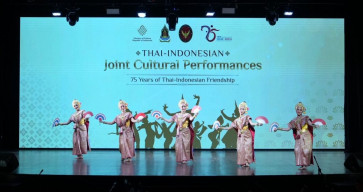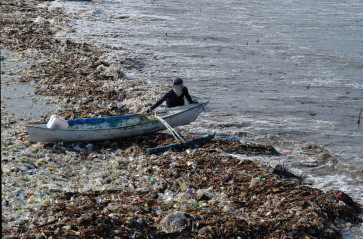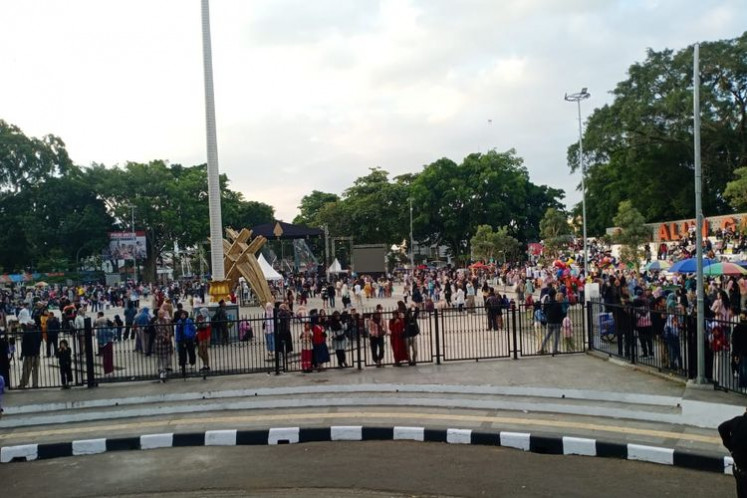Popular Reads
Top Results
Can't find what you're looking for?
View all search resultsPopular Reads
Top Results
Can't find what you're looking for?
View all search resultsNurdin Gogo: Preserving an antique Koran in Alor
JP/Yemris FointunaFew people know that in Alor Besar village in Alor regency, East Nusa Tenggara, a Koran believed to be 800 years old remains well-kept by its inheritor, Nurdin Gogo, who says he received divine and ancestral messages to take good care of the treasure
Change text size
Gift Premium Articles
to Anyone
J
em>JP/Yemris FointunaFew people know that in Alor Besar village in Alor regency, East Nusa Tenggara, a Koran believed to be 800 years old remains well-kept by its inheritor, Nurdin Gogo, who says he received divine and ancestral messages to take good care of the treasure.
The fisherman, 39, as caretaker of the house with the holy book, said he didn’t want to have another mishap that could endanger the book, which was brought from Ternate, North Maluku, to Alor centuries ago.
“In 1982, my grandfather’s house caught fire, burning furniture yet leaving the Koran in a wooden box intact,” he said recently. “Nobody knew for certain that inside the box was a historic holy book used by early proselytizers to disseminate Islam,” he said.
His grandfather forbade all family members from going near the box hanging on the wall, telling them that it contained a sacred object. Only after the fire did the residents of Alor Besar become aware of the existence of the Koran handwritten on paper made of tree bark.
“From then on the news spread to Kalabahi, the capital of Alor, and other regions,” Nurdin said. As the current inheritor and keeper of the book, Nurdin has to nurture deep faith within himself, perform religious duties, maintain good conduct and observe some taboos.
“We will be warned if there’s something wrong with the family, sometimes by a man we’ve never met. A man in a white robe once came here to take the holy book because my wife kept it in her wardrobe,” he said.
A famous ustad or religious teacher from East Java who doubted the authenticity of the Koran visited the house with some journalists and took pictures without prior permission. As a result, all the photos taken turned black. “The ustad readily apologized and finally I allowed them to photograph, but only once each. Their further shots turned out to be blank as they had just been given a single chance,” he said.
Alor Besar is a small coastal village adjacent to a soaring hill with a vast expanse of sea in front. Most of its people work as dry-land farmers and traditional fishermen using fish traps. With an entirely Muslim population, Alor Besar has a grand mosque right in the middle of the village. About a kilometer away, there is a Christian community with a large church.
Although the village is only 25 kilometers from Kalabahi, little is known about the old scripture believed to be part of the history of Islamic civilization in Indonesia, perhaps even Southeast Asia. The book contains 30 juz (sections) or 114 surah (chapters) in black and red handwriting. It is 30 centimeters long, 20 centimeters wide, and has a thickness of 10 centimeters.
Upon closer look, its unique feature becomes apparent, with the sheets of the antique book made of tree bark, now turning yellow and fading in color due to age. “No experts have yet been able to identify the type of bark used to form the pages bound in this Koran,” Nurdin said.
According to Nurdin, the treasured book was brought to Alor Island from Ternate during the reign of Sultan Baabbulah around 1519 aboard a sailboat called Tuma Ninah, with the mission of spreading Islam to several kingdoms in the western part of the sultanate. The five Gogo brothers execute this sacred duty were Ilyas, Iang, Djou, Boi and Kimales.
While sailing, the Islamic missionaries ran out of water and food and had to berth at Tanjung Bota (now Alila village) on Alor. “With no fresh water, legend has it that one of the five, Iang Gogo, thrust his stick into the sand and water promptly gushed out to satisfy their thirst. The source is today known as the Banda spring in Alila village,” he said.
After obtaining food and other supplies, the brothers continued their journey to the king of Bungabali, Baololong I, in the Tang Tang palace hall on Alor. At the meeting, King Baololong I offered them a souvenir in the form of a circumcision knife, with the guests handing over a bronze drum in return.
The meeting ended in a consensus in which one of the religious brothers was requested by the Bungabali kingdom to stay to disseminate Islam in Alor. The five eventually agreed that Iang Gogo would settle in Alor, carrying a Koran and the knife given by the king.
“Before parting, the brothers also agreed to meet again in the same hall. But further developments caused all five, with the warm reception of the converted community, to remain in Alor separately,” Nurdin said.
Iang Gogo married a noble lady of Bungabali named Bui Haki and settled in Alor Besar. Two of the four lived in Tuabang and Baranusa (Pantar Island) and the rest in Solor and Kui-Lerabaing, East Flores.
Up to the present day, the descendants of Iang Gogo and Bui Haki live in Alor Besar, Alor Kecil, Alila, Dulolong and other villages in Alor regency. “I belong to the 14th generation, inheriting and keeping the house and the Koran handed down by my forebears,” said Nurdin, who has two wives and two children.










